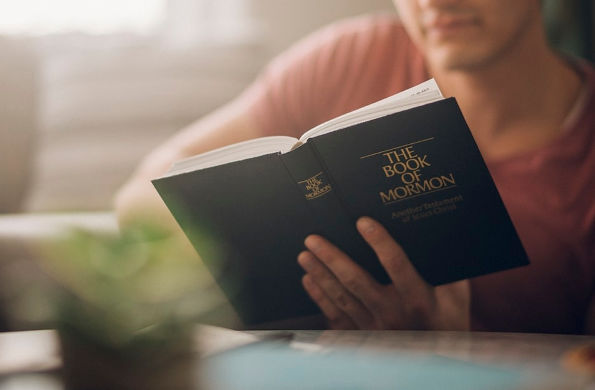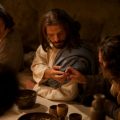The Book of Mormon is filled with examples of times when following Jesus Christ blessed the people of ancient days on the American continent, and how He continues to lift us today as we implement the truths revealed therein.
The people lived the commandments then, and with hindsight the prophets testified of their veracity and preserved them in a record on golden plates for our benefit today. The prophets shared the circumstances of people that were not so faithful as well. I want to share an example of why this is so important to our lives now. We’ll go directly to the claims made by that very record, which is to testify of Jesus Christ.
We invite all men everywhere to read the Book of Mormon, to ponder in their hearts the message it contains, and then to ask God, the Eternal Father, in the name of Christ if the book is true. Those who pursue this course and ask in faith will gain a testimony of its truth and divinity by the power of the Holy Ghost. (See Moroni 10:3–5.)
Those who gain this divine witness from the Holy Spirit will also come to know by the same power that Jesus Christ is the Savior of the world, that Joseph Smith is His revelator and prophet in these last days, and that The Church of Jesus Christ of Latter-day Saints is the Lord’s kingdom once again established on the earth, preparatory to the Second Coming of the Messiah.
This excerpt comes from the introduction in the Book of Mormon – Another Witness of Jesus Christ.
Without reservation, I promise you that if you will prayerfully read the Book of Mormon, regardless of how many times you previously have read it, there will come into your hearts an added measure of the Spirit of the Lord. There will come a strengthened resolution to walk in obedience to His commandments and a stronger testimony of the living reality of the Son of God.
President Russell M. Nelson and many other leaders of the Church have continued to extol the Book of Mormon to people throughout the world.
“I would like to add my testimony of the divinity of this book. I have read it many times. I have also read much that has been written about it. Some authors have focused upon its stories, its people, or its vignettes of history. Others have been intrigued by its language structure or its records of weapons, geography, animal life, techniques of building, or systems of weights and measures.
Interesting as these matters may be, study of the Book of Mormon is most rewarding when one focuses on its primary purpose—to testify of Jesus Christ. By comparison, all other issues are incidental” (Russell M. Nelson, “A Testimony of the Book of Mormon,” October 1999).
“The Atonement is the very root of Christian doctrine. You may know much about the gospel as it branches out from there, but if you only know the branches and those branches do not touch that root, if they have been cut free from that truth, there will be no life nor substance nor redemption in them” (Boyd K Packer, “The Mediator,” April 1977).
“The more you understand the Atonement and what it means, the less likely you will be to fall prey to temptations of the adversary. No other doctrine will bring greater results in improving behavior and strengthening character than the doctrine of the Atonement of Jesus Christ” (Joseph B Wirthlin, “You’ll Grow Into It,” New Era, November 2000).
“I told the brethren that the Book of Mormon was the most correct of any book on earth, and the keystone of our religion, and a man would get nearer to God by abiding by its precepts, than by any other book” (Joseph Smith, “Introduction to the Book of Mormon,” The Book of Mormon).
“The Book of Mormon is the keystone of [our] testimony. Just as the arch crumbles if the keystone is removed, so does all the Church stand or fall with the truthfulness of the Book of Mormon. The enemies of the Church understand this clearly. This is why they go to such great lengths to try to disprove the Book of Mormon, for if it can be discredited, the Prophet Joseph Smith goes with it. So does our claim to priesthood keys, and revelation, and the restored Church. But in like manner, if the Book of Mormon be true—and millions have now testified that they have the witness of the Spirit that it is indeed true—then one must accept the claims of the Restoration and all that accompanies it. Yes, the Book of Mormon is the keystone of our religion—the keystone of our testimony, the keystone of our doctrine, and the keystone in the witness of our Lord and Savior” (Ezra Taft Benson, “The Book of Mormon—Keystone of Our Religion,” October 1986).
To hear someone so remarkable say something so tremendously bold, so overwhelming in its implications, that everything in the Church—everything—rises or falls on the truthfulness of the Book of Mormon and, by implication, the Prophet Joseph Smith’s account of how it came forth, can be a little breathtaking. It sounds like a “sudden death” proposition to me. Either the Book of Mormon is what the Prophet Joseph said it is or this Church and its founder are false, fraudulent, a deception from the first instance onward.
To read more of Walter’s articles, click here.
Not everything in life is so black and white, but it seems the authenticity of the Book of Mormon and its keystone role in our belief is exactly that. Either Joseph Smith was the prophet he said he was…or else he [was] not. And if he [was] not…he is not entitled to retain even the reputation of New England folk hero or well-meaning young man or writer of remarkable fiction. No, and he is not entitled to be considered a great teacher or a quintessential American prophet or the creator of great wisdom literature. If he lied about the coming forth of the Book of Mormon, he is certainly none of those.
I feel about this as C. S. Lewis once said about the divinity of Christ: ‘I am trying here to prevent anyone saying the really foolish thing that people often say about Him: [that is,] ‘I’m ready to accept Jesus as a great moral teacher, but I don’t accept his claim to be God.’ That is the one thing we must not say. A man who was merely a man and said the sort of things Jesus said would not be a great moral teacher. He would either be a lunatic—on the level with the man who says he is a poached egg—or else he would be the Devil of Hell. You must make your choice. Either this man was, and is, the son of God: or else a madman or something worse. You can shut Him up for a fool, you can spit at Him and kill Him as a demon; or you can fall at His feet and call Him Lord and God. But let us not come with any patronizing nonsense about His being a great human teacher. He has not left that open to us. He did not intend to’ (Mere Christianity, New York: Macmillan Publishing Co., 1952, pp. 40–41).
I am suggesting that we make exactly that same kind of do-or-die, bold assertion about the restoration of the gospel of Jesus Christ and the divine origins of the Book of Mormon. We have to. Reason and rightness require it. Accept Joseph Smith as a prophet and the book as the miraculously revealed and revered word of the Lord it is or else consign both man and book to Hades for the devastating deception of it all, but let’s not have any bizarre middle ground about the wonderful contours of a young boy’s imagination or his remarkable facility for turning a literary phrase. That is an unacceptable position to take—morally, literarily, historically, or theologically” (Jeffrey R. Holland, “True or False,” Ensign, June 1995).
“I feel certain that if, in our homes, parents will read from the Book of Mormon prayerfully and regularly, both by themselves and with their children, the spirit of that great book will come to permeate our homes and all who dwell therein. The spirit of reverence will increase; mutual respect and consideration for each other will grow. The spirit of contention will depart. Parents will counsel their children in greater love and wisdom. Children will be more responsive and submissive to the counsel of their parents. Righteousness will increase. Faith, hope, and charity—the pure love of Christ—will abound in our homes and lives, bringing in their wake peace, joy, and happiness” (Marion G. Romney, “The Book of Mormon,” April 1980).
The Church has put a great deal of work in a multi-year filming project to capture many of the cherished Book of Mormon stories as videos; they are well into filming the third of four seasons. Here is what others are saying:
“These new videos are fabulous and the ‘making of’ ones like this help us appreciate better what went into creating them. I feel the Spirit watching them too!”
“I love to see this movies strengthen my faith and really touch my heart. I know that the Book of Mormon is true.”
“It does not play like a ‘talk’ at all. It’s moving and touching and beautiful. Love, love it. Well done.”
“This is just how I imagined it reading the Book of Mormon.”
“I knew the stories, but now I have lived the stories.”
What will your reaction be?
About Walter Penning
In 1989, Walter Penning formed a consultancy based in Salt Lake City and empowered his clients by streamlining processes and building a loyal, lifetime customer base with great customer service. His true passion is found in his family. He says the best decision he ever made was to marry his sweetheart and have children. The wonderful family she has given him and her constant love, support, and patience amid life's challenges is his panacea.
Twitter •







